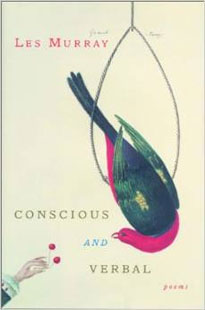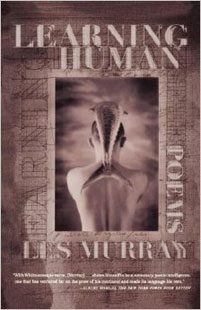Griffin Poetry Prize 2002
International Shortlist
Book: Conscious and Verbal
Poet: Les Murray
Publisher: Farrar, Straus & Giroux, Duffy & Snellgrove and Carcanet, distributed in Canada by Douglas & McIntyre Ltd.
Actor Stephen Jennings reads The Instrument, by Les Murray
The Instrument
Who reads poetry? Not our intellectuals;
they want to control it. Not lovers, not the combative,
not examinees. They too skim it for bouquets
and magic trump cards. Not poor schoolkids
furtively farting as they get immunized against it.Poetry is read by the lovers of poetry
and heard by some more they coax to the café
or the district library for a bifocal reading.
Lovers of poetry may total a million people
on the whole planet. Fewer than the players of skat.What gives them delight is a never-murderous skim
distilled, to verse mainly, and suspended in rapt
calm on the surface of paper. The rest of poetry
to which this was once integral still rules
the continents, as it always did. But on condition nowthat its true name’s never spoken: constructs, feral poetry,
the opposite but also the secret of the rational.
And who reads these? Ah, the lovers, the schoolkids,
debaters, generals, crime-lords, everybody reads them:
Porsche, lift-off, Gaia, Cool, patriarchy.Among the feral stanzas are many that demand your flesh
to embody themselves. Only completed art
free of obedience to its time can pirouette you
through and athwart the larger poems you are in.
Being outside all poetry is an unreachable void.Why write poetry? For the weird unemployment.
For the painless headaches, that must be tapped to strike
down along your writing arm at the accumulated moment.
For the adjustments after, aligning facets in a verb
before the trance leaves you. For working always beyondyour own intelligence. For not needing to rise
and betray the poor to do it. For a non-devouring fame.
Little in politics resembles it: perhaps
the Australian colonists’ re-inventing of the snide
far-adopted secret ballot, in which deflation could hideand, as a welfare bringer, shame the mass-grave Revolutions,
So axe-edged, so lictor-y.
Was that moral cowardice’s one shining world victory?
Breathing in dream-rhythm when awake and far from bed
evinces the gift. Being tragic with a book on your head.From Conscious and Verbal, by Les Murray
Copyright © 2001 by Les Murray
Griffin Poetry Prize 2001
International Shortlist
Book: Learning Human
Poet: Les Murray
Publisher: Farrar, Straus & Giroux, Carcanet (UK)
Narrator Peter Reynolds reads An Absolutely Ordinary Rainbow, by Les Murray
An Absolutely Ordinary Rainbow
The word goes round Repins,
the murmur goes round Lorenzinis,
at Tattersalls, men look up from sheets of numbers,
the Stock Exchange scribblers forget the chalk in their hands
and men with bread in their pockets leave the Greek Club:
There’s a fellow crying in Martin Place. They can’t stop him.The traffic in George Street is banked up for half a mile
and drained of motion. The crowds are edgy with talk
and more crowds come hurrying. Many run in the back streets
which minutes ago were busy main streets, pointing:
There’s a fellow weeping down there. No one can stop him.The man we surround, the man no one approaches
simply weeps, and does not cover it, weeps
not like a child, not like the wind, like a man
and does not declaim it, nor beat his breast, nor even
sob very loudly – yet the dignity of his weepingholds us back from his space, the hollow he makes about him
in the midday light, in his pentagram of sorrow,
and uniforms back in the crowd who tried to seize him
stare out at him, and feel, with amazement, their minds
longing for tears as children for a rainbow.Some will say, in the years to come, a halo
or force stood around him. There is no such thing.
Some will say they were shocked and would have stopped him
but they will not have been there. The fiercest manhood,
the toughest reserve, the slickest wit amongst ustrembles with silence, and burns with unexpected
judgements of peace. Some in the concourse scream
who thought themselves happy. Only the smallest children
and such as look out of Paradise come near him
and sit at his feet, with dogs and dusty pigeons.Ridiculous, says a man near me, and stops
his mouth with his hands, as if it uttered vomit –
and I see a woman, shining, stretch her hand
and shake as she receives the gift of weeping:
as many as follow her also receive itand many weep for sheer acceptance, and more
refuse to weep for fear of all acceptance,
but the weeping man, like the earth, requires nothing,
the man who seeps ignores us, and cries out
of his writhen face and ordinary bodynot words, but grief, not messages, but sorrow,
hard as the earth, sheer, present as the sea –
and when he stops, he simply walks between us
mopping his face with the dignity of one
man who has wept, and now has finished weeping.Evading believers, he hurries off down Pitt Street.
From Learning Human, by Les Murray
Copyright © 2000 by Les Murray


it made me laugh